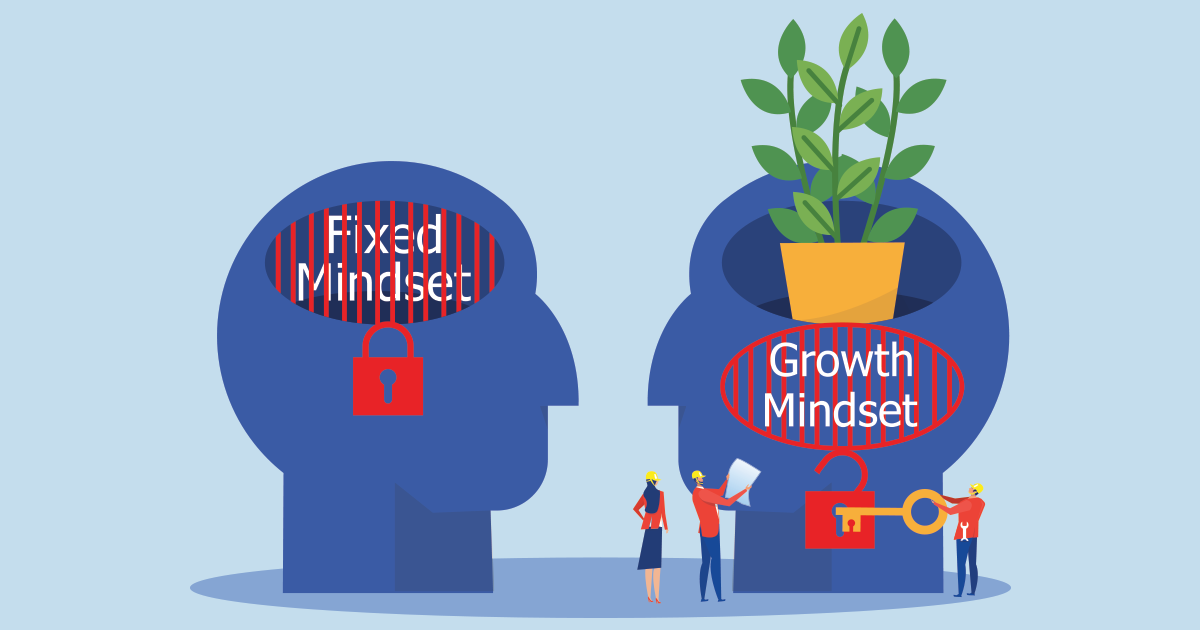It is possible that how we see ourselves and our skills might significantly impact how our lives turn out. Absolutely. How we think about our intellect and talents influences how we feel and what we achieve, whether we stick to new habits, and whether we continue learning new skills.
A growth mindset means you believe you can improve your intelligence and talents over time. Those who have a fixed mindset feel that their intellect is fixed and that they would never be excellent at anything. So let’s take a look at growth vs. fixed mindsets, investigate the science, and see how people can shift their mindsets over time.
What does Growth Mindset Mean?
People who have a growth mindset are motivated by the concept that intelligence and skill may be improved through practice and exposure to various settings and experiences.
Having a growth mindset doesn’t automatically make you the next Albert Einstein; there are still limits to what we can accomplish in our lifetime. Growing one’s intelligence and abilities is simply believing one can do so through hard work and deliberate effort.
People who have a growth mindset can bounce back from failures by boosting their motivating efforts.
A growth mindset sees ‘failures’ as temporary and reversible, and as such, it is critical for learning, resilience, motivation, and performance.
Growth mindset adopters are more likely to:
- Embrace lifelong learning
- Believe effort leads to mastery
- Believe failures are just temporary setbacks
- View feedback as a source of information
- Believe intelligence can be improved
- Put in more effort to learn
- Take inspiration from the accomplishments of others.
- View feedback as an opportunity to learn
- accepts challenges with open arms
What is a Fixed Mindset?
There is no room for growth in a fixed mindset, which states that one’s intelligence and natural talents are pre-determined.
People with a restricted view of life are more likely to run away from difficulties, give up quickly, or feel intimidated by the achievement of others. This is partly due to the fixed mindset’s view of intelligence and talent as something you “are” rather than something you can cultivate and enhance.
Constantly thinking negatively is a risk associated with rigid outlooks. Because of their fixed mindset, some people believe that if they fail at something, it is because they lack the intelligence to succeed. Instead, someone with a growth mindset may fail at the same task and conclude that they must practice more until it becomes second nature to them.
Believing that individual traits cannot be changed no matter how much effort you put in, people with a fixed mindset tend to:
- Believe intelligence and talent are static
- Feel Intimidated by the achievements of other people
- Mask Shortcomings to avoid criticism
- Believe that their efforts are in vain
- Give up easily
- Avoid challenges to avoid failure
- Ignore feedback from others
- View feedback as personal criticism
The Differences Between a Growth Mindset and a Fixed Mindset
- Challenges
In a fixed mindset, difficulties are perceived as potential threats. However, opportunities to learn new things and become more knowledgeable are seen as expansion possibilities in a growth mindset.
- Weaknesses
People who have a growth mindset are aware of their shortcomings, which helps them become wiser. Their learning methods will be more flexible if they know how to improve and where their weaknesses lie. People who have a fixed mindset, on the other hand, deny their weaknesses and are frequently too intimidated to take action to improve themselves because of them.
- Goals
Having a growth mindset allows you to set optimistic and realistic goals because it makes you more comfortable dealing with the areas you struggle with. On the other hand, having a fixed mindset frequently results in setting pessimistic and unrealistic goals because limitations typically overshadow possibilities.
- Intelligence
Because they think that individuals are either born brilliant or dumb, those with a fixed mindset on intelligence see it as a fixed trait. While a fixed mentality believes that intellect cannot be increased, a growth mindset believes that intelligence may be enhanced to a substantial degree via diverse techniques.
- Pressure From Peers
People who have a fixed mindset are more likely to give in to peer pressure because they seek social approval more frequently. On the other hand, people who have a growth mindset are more likely to remain committed to their objectives and to have the courage to avoid compromising their potential.
- Persistence
People who have a fixed mindset are more likely to give up easily and wonder, “what’s the point?” in their minds. On the other hand, individuals who have a growth mindset are mindful that they have long-term goals, which direct their decisions and efforts in the here and now.
- Traits
A person with a fixed mindset evaluates a person’s potential based on inherited characteristics. In contrast, a person with a growth mindset evaluates a person’s aptitudes as founded on experience and practice. A fixed mindset places more emphasis on a person’s traits.
- Place or Origin of Control
Those with a fixed mindset allow their shortcomings to consume them and blame their misfortunes on things beyond their control, such as luck. People who have a growth mindset look at setbacks as learning opportunities that can make them more knowledgeable. They have the empowered view that allows them to take control of situations because their locus of control is within themselves.
- New Tasks
When someone has a fixed mindset, they tend to react with fear when faced with new challenges because they view these obstacles as potential paths to failure. However, a growth mindset considers challenges and setbacks as opportunities for one’s development and promotes an attitude of positivity in response to these challenges.
- Reflection
In contrast to those who have a fixed mindset, those who have a growth mindset are more likely to reflect on their day-to-day experiences to make the most of their learning opportunities.
Mental Health Treatment in California
Developing a growth mindset is one of the most important things once you note the difference. For tips on developing a growth mindset, you can trust us to help you with effective methods.
If you’re looking to get a stronger grasp on your mindset and mental health, Story Wellness can help you take control of your narrative, call today at (866) 476-2823.





